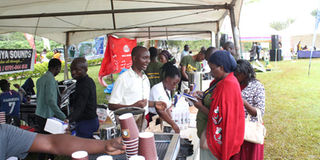Naro to commercialise products

What you need to know:
It is his contention that the increasing human population with ever changing preferences is leading to expansion of regional markets and globalisation amidst climate change effects which has increased demand for improved agricultural technologies, products and services for improved livelihoods.
The National Agriculture Research Organisation (Naro) is laying a strategy of moving its products from research laboratories to commercialisation.
The scientists are teaming up with private sector companies which are already conducting business using some of the products developed at the various Institutes.
This was revealed by Naro Director General, Dr Ambrose Agona, during a dialogue meeting with the private sector in Kampala to discuss approaches they will use in an effort to commercialise their technologies.
This is a project funded under USAID feed the future project worth $10m (Shs36b) running for five years.
Products
Naro has identified eight products for interested private sector companies to add value to them. They include banana, coffee, beans, cassava, sorghum, Irish potatoes, poultry and maize.
Dr Agona notes that there are so many innovations Naro scientists have come up with but they have been on the shelves thus the need to roll them out to the public.
“The Naro team is very weak in marketing its products yet donor funds to carry out research are not forthcoming, as such there is need for the organisation to make its own money to run its day to day activities. We have formed Naro Holdings Ltd, a private wing that will oversee commercialisation of Naro technologies to which value has been added jointly with the private sector,” he noted.
Market
It is his contention that the increasing human population with ever changing preferences is leading to expansion of regional markets and globalisation amidst climate change effects which has increased demand for improved agricultural technologies, products and services for improved livelihoods.
This, therefore calls for multifaceted sustainable strategies to meet the ever increasing demand. This can only be achieved by exposing the private sector companies to interact with Naro scientists who are engaged in adding value to a number of products in a bid to take it to commercialisation level.
The deputy director general at Naro, Dr Sadik Kassim, noted that Naro’s strategy is to innovate its products for sustainable agricultural transformation focusing on promotion of food security, agro industry processing and mitigation of climate change effects by ensuring sustainable natural resource management.
The agribusiness manager at Uganda Breweries, Joseph Kawuki, is optimistic that if Naro scientists and the private sector work together, the brewing industries will be adequately supplied with local raw materials grown by farmers within the country.
“We are currently working with farmers in Sebei and Kigezi region who are growing barley for our consumption,” said Kawuki.




